Migrant contributing as a volunteer
Iraqi migrant Nasir Ajmaya is using his own life experiences to help newcomers to Australia begin their lives here.
Nasir experienced war, the impoverishing impact of international sanctions against his country and health problems before coming to Australia in 2009.
 An engineer by training Nasir is now studying community development and is volunteering with refugee and migrant settlement agency AMES Australia as he fulfils his passion to help people.
An engineer by training Nasir is now studying community development and is volunteering with refugee and migrant settlement agency AMES Australia as he fulfils his passion to help people.
“After coming through a lot of problems in my life I realised that I wanted to do something to help people and I started looking for opportunities – and that’s when I came across AMES,” Nasir said.
He has supported newly arrived clients who have been chronically ill, he’s taken disabled children to Christmas parties and young clients to football matches.
Nasir has also helped facilitate water safety sessions, assisted refugee families with medical and other appointments and also with language support.
“For me, volunteering is a passion. Not only are you able to make a difference in people’s lives, you learn a lot yourself. I have learned how to be a better communicator and I’ve learned a lot about different cultures,” Nasir said.
Nasir left his homeland in 1978 to study engineering in the United Kingdom.
“This was just around the time Saddam took power so I was lucky and my family sacrificed a lot to support me,” Nasir said.
But worried about his family at the outset of the Iran-Iraq war, Nasir returned home only to be drafted into the Iraq militia.
After just ten days training, he was given a rifle and sent to the front lines of the conflict.
“I was nearly killed when a rocket propelled grenade exploded next to me. I was lucky to survive – if it hadn’t been for a small wall between me and the blast, I wouldn’t be here.
“When I finally got home, I told my parents what had happened and they said I had to go back to the UK,” Nasir said.
He returned to Oxford and studied aircraft maintenance eventually marrying a local woman.
When the marriage broke down in 1990 Nasir lost everything, including his health.
“I couldn’t go back to Iraq because of the war with Kuwait and I couldn’t stay in the UK,” Nasir said.
“I was on medication for my health problems so I couldn’t work as an engineer,” he said.
“I worked washing dishes and doing whatever I could and eventually went back to Iraq,’ Nasir said.
But by then the post-Gulf War sanctions were biting the economic situation in Iraq had become dire.
“It affected everybody. People were really struggling to make ends meet,” Nasir said.
“Somehow it made me realise things were not so bad for me because of what was happening around me,” he said.
Over the next few years Nasir travelled back and forth between Iraq and the UK eventually marrying his current wife Balsam.
“My wife’s family came to Australia in 2006 and we followed them in 2009. I’ve never looked back. Australia gave us a feeling of change and renewal,” Nasir said.
Nasir has two school-age children and is studying a course in community development.
He is also active in the Melbourne Chaldinian Christian community.
Nasir said that for decades Christians lived peacefully in Sunni Muslim – dominated Iraq.
“But Christians in Iraq started leaving in the 1990s and now about two million have left as persecution increased, and after the war being a Christian became a problem,” he said.
Nasir said that volunteering in Australia had helped him connect with the broader society.
“Volunteering is a part of Australian culture that I am not used to,” Nasir said.
“In my culture people have to look after themselves financially and in other ways. But if you are motivated and you improve yourself, you can make a career out of it,” he said.
“I enjoy helping people and I believe I have insight into what it’s like to have difficulties in your life. Also, I have lived in the west and I understand middle-eastern culture so I can help people make that adjustment,” Nasir said.
Laurie Nowell
AMES Australia Senior Journalist












